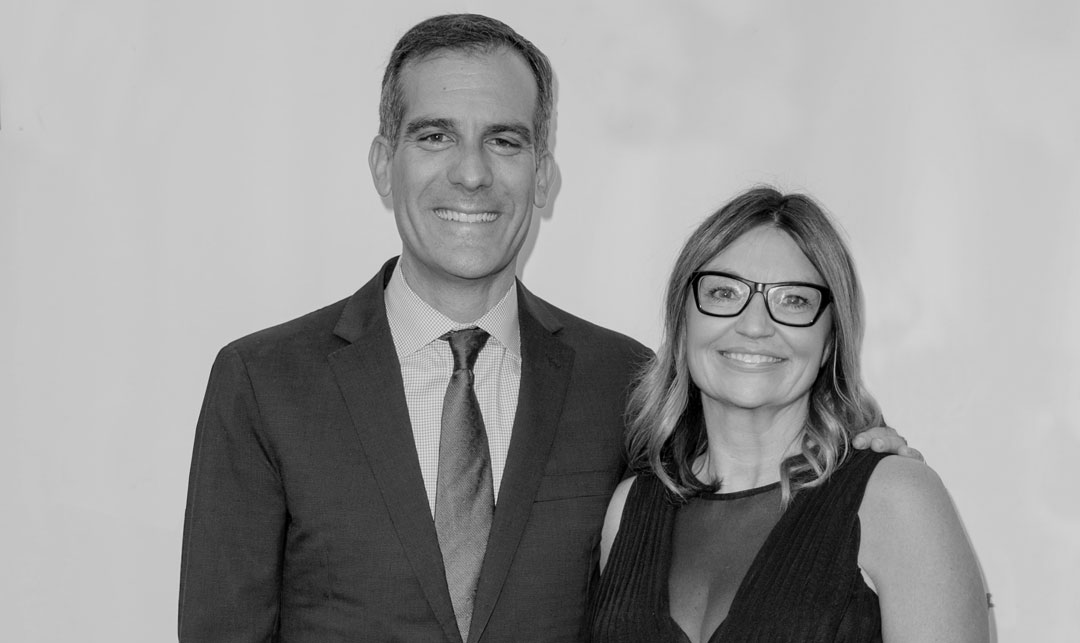Los Angeles, the thriving coastal epicenter of art, entertainment, and innovation, has for years been attracting those who dream, and those who make dreams happen. However, there exists a grim reality hidden within the shadows of our glamorized industries: an underground, unpaid, and enslaved population. While sex trafficking has served as fictionalized fodder for blockbuster films, it’s easy to overlook the truth: slavery is not only alive today, it is larger in number and more lucrative than ever—and LA continues to be a hub for human trafficking in America. Kay Buck, the daring leader and CEO of the Coalition to Abolish Slavery and Trafficking (CAST), prefers to address this atrocity through hope before fear, victory over suffering, and a scalable standard of survivor leadership, empowered advocacy, and systemic change.
In her twenty-seven years at the forefront of this fight, Buck has fostered the rehabilitation of countless survivors, influenced massive policy change, lobbied in D.C., participated in the World Conference on Women, and was also honored with the “Change Maker Dream Maker” award (alongside then-Senator Hillary Clinton).
Defining the Issue
Human trafficking is defined as the exploitation of human beings through force, fraud or coercion for the purposes of commercial sex or forced labor. The Department of Homeland Security includes “modern-day slavery” in its definition of the industry. This translates to prostitution, pornography, sex tourism, forced marriage, sweatshop laborers, beggars, child armed forces, migrant farmers (etc.), in which the worker has been manipulated, deceived, threatened and/or forced into action. And the income? Forget about even collecting a portion of the profits—many trafficking survivors actually accrued impossible and undeserved debt to their traffickers while under their control.
According to UNICEF, there are an estimated 21 million people currently trafficked around the world, a number that is rising with the trend of recruiting and sexually exploiting children online. In 2014, the International Labour Organization (ILO) debunked prior estimates of the true revenue to be made from enslaving humans—more than $150B in illegal profits annually, placing it in the top three highest grossing criminal industries worldwide.
As Angelenos, we are hardly removed from the context of this crime. The National Human Trafficking Resource Center listed California as leading the human trafficking exchange year over year, with 1,331 cases reported in 2016 alone.
Learning From Women’s Asia
When asked what prompted her to pursue a lifelong fight for such a challenging cause, Buck reflects on her time in Asia—the root of her involvement—with reverence. “I was in Japan [and Thailand] in the early 1990s, when nobody really used the term ‘human trafficking’ yet. Except for a select group of people, mostly women,” she says. She saw this terminology take flight leading up to the 1995 UN Conference on Women in China, when Hillary Clinton coined the phrase, “Women’s rights are human rights.”
Buck had been working in Japan with the Asian Women’s Shelter, in the outskirts of Tokyo. “It was a shelter that housed domestic violence survivors,” she says. “At the time, no one had shelters for trafficked women, so we created a design that adapted to that population. Between the language and cultural barriers, and the lack of institutionalized knowledge across the board, it was very difficult. But it was my job to see how we could adapt this model of shelter, safety, and services for women who needed it.”
This collective effort led her to some of the greatest mentors and influencers of her life, with Yayori Matsui (author of Women’s Asia) at the forefront. “She was a feminist before her time,” she says admiringly. “She was a woman of grit who never minced words.”
Matsui’s transparency inspired some of Kay’s best practices in broad-based coalitions and taught her the importance of diplomacy. “She really made a huge impact on me, because she was doing cutting-edge work and saying things that, at the time, no one else was willing to speak out on,” says Kay. “Through her, I met an underground network of strong female leaders. It was amazing.”
Accelerating Abolition in America
When Buck moved to the States in 1995 to continue the work she started in Asia, she was shocked to find a general unawareness of human trafficking stateside. “At the time, we didn’t even have state laws [surrounding the issue],” she says. When CAST—the longest-running, LA-based, anti-trafficking NGO and leader of the domestic abolitionist movement—scouted her from Sacramento, Buck saw an opportunity to help remedy that discrepancy.
Under her leadership, CAST has been fundamental in passing key legislation initiatives to promote positive change and rehabilitation for survivors. The organization has partnered with policy makers, police forces, government agencies, legal counsel, trauma specialists, and service providers to address the flawed narrative around human trafficking and create lasting systemic change.
When you’re investing in the fight against human trafficking, you’re really investing in human beings in your community.Often times, once people learn that, they absolutely want to help make a difference.
Kay describes the original partnership between CAST, the U.S. Attorney’s Office, the FBI, and the U.S. Department of Labor as a “tripod leadership call-to-task force,” through which her teams have been able to contribute training, technical expertise, and judicial support to local law enforcement jurisdictions. “The model of the taskforce cannot be looked at through only a criminal justice lens… there are human rights at stake. And that is our specialty.” President Obama personally recognized this specialty when he awarded CAST the “Presidential Award for Extraordinary Efforts to Combat Trafficking in Persons” in 2014.
At the core of CAST’s success are the survivors. Not only has the coalition helped to free, transform, and restore the lives of thousands of victims of human trafficking through every phase of their journey, the model created by Buck actually empowers those survivors to rise beyond the stigma of their experience, harness their own voice, and step into leadership and advocacy to impact public policy.
She attributes this to one of her earliest and most memorable survivor encounters, when a young woman told her, “‘I don’t want to be defined by what happened to me. I’m a mother. I’m a daughter. I’m a good worker.’ What struck me most was, she went through something truly horrific … and yet she’s so resilient and confident. All I needed to do was create a safe space, and listen,” Buck says.
Part of accomplishing this task was creating one of CAST’s key differentiators—its National Survivor Network, through which survivors can empower, encourage, and collaborate with each other as more than just victims of a crime. “Now, we don’t have to tell their stories for them,” Buck says with a proud smile. “They are qualified experts in the field of human trafficking and have the experience in public speaking and advocacy to tell their own stories to the people whose hearts and minds we’re trying to change.”
Calling on Los Angeles
While Angelenos are notoriously philanthropic, this is a cause that gets much less air time than others. How, then, has Buck been able to inspire her peers to get more informed, involved, and invested? “Human trafficking is a cause that has global reach. It impacts every corner of our world and every corner of our neighborhood. That said, it is also preventable, and it is not too big to fight. There are things we can do to take action, and the immediate impact of those actions can be seen within our own communities.”
Buck also emphasizes the humanity of the cause: “This is an issue where a person has been exploited at the hands of another human being. When you’re investing in the fight against human trafficking, you’re really investing in human beings in your community. Oftentimes, once people learn that, they absolutely want to help make a difference.”














































